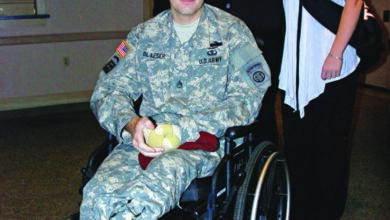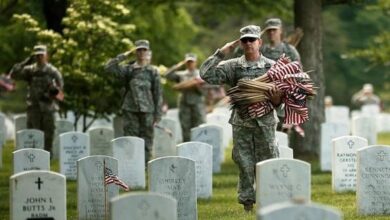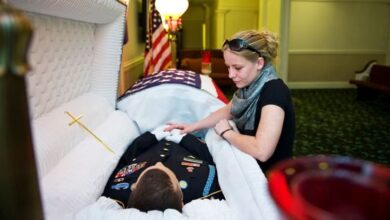Emotions run deep for military’s mortuary workers
Emotions run deep for military’s mortuary workers
- Workers at Air Force Mortuary Affairs Operations receive%2C examine and prepare troops for burial
- Those who come face-to-face with war dead have one of hardest jobs in military
- Most find a way to deal with the sadness and feel empathy for the fallen
DOVER AIR FORCE BASE, Del. — It is sunny, breezy and a bit cool out on the tarmac. And, save for the wind, quiet. Overhead, an incongruous fragment of a rainbow appears in a break in the clouds.
Slowly, six soldiers in their combat camouflage, black berets and desert boots carry a flag-draped silver transfer case, the first of two this day, down a C-17’s lowered ramp. Their carefully measured steps take them across the Dover Air Force Base runway to the rear of a white panel truck. The official party renders salutes, and the silver case is slowly rolled into the truck.
Now begins one of the hardest jobs in the military: coming face-to-face with the dead at the place where every service member killed overseas comes home.
The fallen troops are returning at a far slower clip these days, a pace reflecting a now-ended war in Iraq and the dwindling U.S. presence in Afghanistan.
But the drawdown hasn’t lessened the emotional impact on those who’ve helped receive, examine and prepare for burial the bodies of the 6,770 troops who’ve lost their lives in the war theater over the past 12 years.
“We deal with death here,” said Col. John Devillier, commander of Air Force Mortuary Affairs Operations, or AFMAO, the Dover, Del.-based organization that serves as the Defense Department’s primary mortuary. “This is a tough place to work. There’s no other organization in the DOD that sees the war the way we do.
“I cry a lot,” he said.
One of his veteran sergeants had to stop to compose herself when asked about how she deals with facing so many fallen troops.
“I try not to put too much into it,” said Master Sgt. Elvira Jameson, who helps dress remains for burial in picture-perfect uniforms. “Sometimes, there’s no way around it. You see things that are there; you’ve just got to look through it, and press on.”
Jameson, a member of Dover’s 512th Airlift Wing who has been temporarily assigned to mortuary affairs operations five times, was here when the military and civilian casualties from the 9/11 terrorist attacks began arriving. “That was devastating,” she said.
‘They’re feelings’
Devillier and his 108 workers operate what amounts to the Defense Department’s No. 1 funeral home. Next door, the Armed Forces Medical Examiner System, or AFMES, conducts autopsies and forensic examinations and, upstairs, operates the military’s largest DNA lab.
It’s tough work that wears on even the steeliest minds. Workers at civilian morgues and funeral homes rarely see the sorts of devastation that war can wreak on a body.
“I must admit, I was shocked. I was just shocked,” said Army Col. Ladd Tremaine, a forensic pathologist and the director of AFMES, referring to 2006, his first year with the organization. “It’s really hard to process and describe. I mean, they’re feelings.”
For Navy Capt. Stephen Robinson, a veteran medical pathologist who’s been with AFMES since 2004, a difficult moment came when one of the troops shared his son’s name.
“One of the decedents had my son’s name. Same name. Very disturbing. Especially since he was about the same age my son was then. … That one bothered me for a couple of weeks, actually.”
It’s important, some workers say, to not push the sadness away but rather acknowledge it, and allow oneself to feel empathy for the fallen.
“You have good days and bad days with it,” said the 512th’s Senior Master Sgt. Antoinette Worthey, who has been assigned to AFMAO about 10 times since 2003 and, like Jameson, worked a variety of jobs, such as overseeing the placement of dressed remains into caskets. “If you’re ever to the point where you don’t have those bad days, it’s probably not the place for you to work.”
Some say they can perform with a clinical detachment.
“I try to understand how that person died,” said Earl Jarrett, a forensic autopsy assistant who has worked at AFMES since 2004 and teaches related classes at the University of Delaware and Delaware State University. “If I did think about it, I look at it as a learning process.”
Jarrett said he doesn’t decompress. “I keep myself really busy,” he said.
Helping to cope
Jarrett would appear to be in the minority. The overall emotional drain of the work at AFMES and AFMAO is such that the No. 2 job of the seven chaplains the two groups share — after ministering to grieving families — is taking care of the workers.
David Sparks, a civilian who was an Air Force Reserve chaplain when he was called up after 9/11, related a recent example.
“Just the simple impact of one of our troops seeing a family just emotionally took them to the ground for a little bit,” said Sparks. “They needed somebody to talk to.
“We address these things so quickly that what could be the long-term negative effects of this kind of work, this kind of stress … we just work very hard that that doesn’t get to build up,” he said.
It’s not easy on the chaplains, either.
“I have bad days,” Sparks admitted. “A family will cause more of an emotion in me than other families.”
What helps a lot, most say, is remembering that the families of the fallen are relying on them for two things: the truth about how their loved ones died and “zero defects” in handling a case.
“You know, in the back of your mind, that you have a family that wants their family member back,” Jameson said. “And that’s the greatest gift, is for them to have that closure.”
The chaplains hold classes and prayer or meditation groups and classes on healthy relationships.
A favorite among workers, Sparks said, are what he called the “free-flowing, free-form” pizza and conversation get-togethers on Wednesday nights.
“What it provides for is a really safe place for the folks who work here … to let off some frustrations about life, work, people, whatever,” he said. Troops and civilians also unwind at a large workout area and a comfortable break room.
“Everyone has their own way,” Robinson said. “Personally, I just go off to myself. Read a book. Watch a movie. Sometimes I’ll take a trip. The Lewes (Del.) Ferry into Cape May (N.J.)? A couple days there is good for the soul.”






